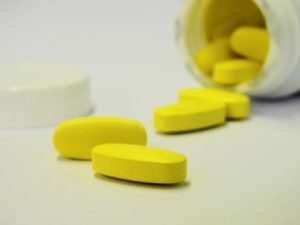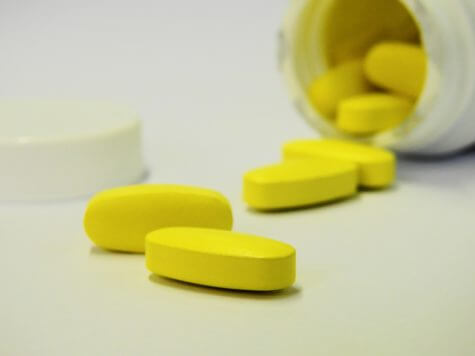TORONTO — Taking multivitamins or other commonly consumed vitamin and mineral supplements won’t actually provide you any health benefits, but they won’t harm you either, a new study finds.
Researchers from the University of Toronto and St. Michael’s Hospital conducted a review of 179 studies on popular vitamin supplements that were published between January 2012 and October 2017. Studies covered a vast spectrum of supplements, including vitamins A, B1, B2, B3 (niacin), B6, B9 (folic acid), C, D and E; and mineral supplements β-carotene; calcium; iron; zinc; magnesium; and selenium. Multivitamins that contained a wide variety of the vitamins and minerals were also reviewed.

The research team concluded that the most commonly consumed supplements — multivitamins, vitamin D, calcium, and vitamin C — had no effect on a person’s risk of suffering a heart attack stroke, heart disease, or early death.
“We were surprised to find so few positive effects of the most common supplements that people consume,” notes Dr. David Jenkins, the study’s lead author, in a statement. “Our review found that if you want to use multivitamins, vitamin D, calcium or vitamin C, it does no harm – but there is no apparent advantage either.”
The only supplements that showed any benefit among the studies were folic acid or B-vitamins that contained B6, B12, and folic acid, which could lower one’s risk of heart disease and stroke. Folic acid alone showed a 20 percent lowered risk of stroke. Conversely, the review found that niacin and antioxidants had a “very small” effect that could potentially raise the risk of death from any cause.
The authors say it’s best to stick to a healthy diet that includes plenty of fruits and vegetables which naturally provide our bodies with vitamins and minerals.
“In the absence of significant positive data – apart from folic acid’s potential reduction in the risk of stroke and heart disease – it’s most beneficial to rely on a healthy diet to get your fill of vitamins and minerals,” says Dr. Jenkins. “So far, no research on supplements has shown us anything better than healthy servings of less processed plant foods including vegetables, fruits and nuts.”
Jenkins says it’s important that people be aware of what types of supplements they’re taking and to always consult a doctor, particularly if they have any specific deficiencies.
“These findings suggest that people should be conscious of the supplements they’re taking and ensure they’re applicable to the specific vitamin or mineral deficiencies they have been advised of by their healthcare provider,” adds Jenkins.
According to the National Health and Nutrition Examination Survey, in 2012, it was estimated that 52 percent of the population were taking supplements.
The full study was published in the June 5, 2018 edition of the Journal of the American College of Cardiology. It was funded by the Canada Research Chair Endorsement, Loblaw Cos. Ltd., and the Canadian Institutes for Health Research.

These articles are always so confusing. The headline says there are “no health benefits” and pulls that quote from here: ” [vitamins] had no effect on a person’s risk of suffering a heart attack stroke, heart disease, or early death.” Does this means they only tested these three things? Also this “study” seems more like a “study” where they just send out a questionnaire and ask if you took a multivitamin and then ask if you’ve had a stroke. They didn’t give people pills and then monitor them.
Excellent book. Ignore New Age stuff if you want to; the rest is good.
https://smile.amazon.com/Its-Liver-Stupid-5th-Antiaging/dp/1981276726/ref=sr_1_1?ie=UTF8&qid=1527682185&sr=8-1&keywords=its+the+liver+stupid
A huge, multi-decade study was done by the US Government and results released about 10 years ago which showed the same thing – vitamins were useless. I attended a medical grand rounds soon after and that study was analyzed and presented by an epidemiology team. Interesting that the study design was worthless from a statistical standpoint such that no conclusions could be made. The presenter discussed reasons why the US Government would spend millions of dollars on a worthless study and misreport the results. The only rational reasoning was that people were living too long (perhaps from vitamins?) and the US Government has a vested interest in people dying sooner so they are not spending as much money on care. Needless to say, I look at the design of these studies and have found none of any value – I take vitamins every day.
Fake news! Dr. Joel Wallach went to court years ago and sued the FDA and won based on scientific evidence that proved selenium prevents some cancers. Fake, fake news!
These creatures that control things don’t want you taking stuff that helps you. They want to sell you their drugs when you get sick.
Wonder how many of the doctors and researchers take their daily vitamins–just a thought.
Oh how wonderful a study of other studies. Sometimes useful. This time just repackaging standard pablum of eat healthy. LOL Who did the study, where was it published. Other wise this is just pure CRAP and has no bearing on anything – AKA FAKE or JUNK Science
Vitamins and supplements are indeed useless. Worse, they likely harm your health. Whole fruits and vegetables nutrition is how your body was designed. I ditched my multi-vitamins and supplements, and I’ve been using a nutritional product “Juice Plus+”. Much more energy, and I have not missed a day of work due to illness in 5 years. Look it up; it’s the real deal, with an FDA nutrition label; NOT your standard supplement label. In fact, Google, “what is the most researched nutritional product in the world”. You will thank me!
Research for your own benefit. I don’t take the ubiquitous supplements described in this article. However, I take liquid Tumeric and CoQ10 – taken together both have synergistic effect to reduce inflammation, a key component in disease. Tumeric has proven anti-cancer, anti-inflammation properties.
A woman in the UK was sent home after numerous chemo and radiation failed to slow the growth of her cancer. She decided to take “enormous amounts” of pharmaceutical grade Tumeric (unkown quantity). Her doctors have confirmed her cancer is completely gone. That’s the type of evidence I am looking for. Costco sells both CoQ10 and Tumeric cheap.To your health! Here’s another website:
https://futureyouhealth.com/turmeric-plus.html
Read the cancer story here:
http://www.dailymail.co.uk/health/article-4726136/How-curry-spice-helped-dying-woman-beat-cancer.html
CoQ10, B12, and oregano oil capsule, and a baby asprin are all extremely good for your health and heart & prostate.
I just had oatmeal, blue berries, english walnuts, with a table spoon of pure maple syrup. All good for you.
good grief when are these researchers going to join the 21st century. it also looked like they ignored about 10,000 other studies regarding supplements they never bothered to review.
Niacin in fairly high doses has been proven to lower LDL and raise HDL cholesterol. It works for me – 500mg twice daily. It is even prescribed for this.
Wait, how does “heart attack stroke, heart disease, or early death” equate to “no health benefits”? Is this just terrible science journalism or actual shoddy science?